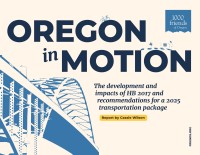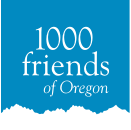By Brett Morgan | 3-minute read
The following is excerpted from the foreword to the report Oregon in Motion: The Development and Impacts of HB 2017 and Recommendations for a 2025 Transportation Package.
“Land use and transportation represent two sides of one coin: The way we connect our communities through various transportation systems impacts the way we use our land. This idea is well rooted in the research history 1000 Friends of Oregon takes pride in – all the way back to the seminal report Making the Land Use, Transportation, Air Quality Connection (LUTRAQ). That report demonstrated how both transportation funding and policy for roads have a direct impact on the air we breathe, and also accelerate the conversion of working lands at the edge of our urban growth boundaries into development, which is at odds with the mission of 1000 Friends and the land use system.
At the risk of repeating, Oregon, and the planet, is currently going through an immense period of change dictated by a need to decarbonize and address climate change. Our changing climate is now the predominant theme on the landscape in Oregon. It is impacting our drinking water, agricultural systems, human health, and infrastructure. Within just a few short years, our frame of reference has shifted; it’s clear that the climate crisis is here, and isn’t just some future problem for us to navigate.
When we take stock of this reality, it’s evident we need to reconsider our approaches to transportation policy. In Oregon, transportation is responsible for 40 percent of our carbon emissions (the largest of any sector), and the Intergovernmental Panel on Climate Change (IPCC) has explicitly stated the transition to electric vehicles will not be enough on its own to decrease emissions below the 1.5 degrees Celsius warming target we must reach in order to avoid the most catastrophic impacts of climate change. In fact, mixed development, transit-oriented design, and other land use reforms can account for a 25 percent reduction in greenhouse gas emissions. This underscores the need to rethink the who, how, where, and why of our transportation system, or we risk perpetuating a financially, and environmentally unsustainable transportation system that is increasingly unsafe for all users.

Because we tend to make major transportation investments in packages, understanding Oregon’s transportation policy history and past packages is a critical step in understanding the current status of transportation policy and funding. Cassie Wilson’s research in this 2023 Gerhardt Report, Oregon in Motion: The Development and Impacts of HB 2017 and Recommendations for a 2025 Transportation Package, establishes a detailed throughline and narrative between our last major transportation package, HB 2017, and the present as Oregon prepares for a 2025 transportation package. This research included watching old committee hearings, reading past testimony, conducting stakeholder interviews with advocates and elected officials, and researching policy in detail to build a digestible narrative. Many stakeholders stated they had fuzzy memories of the last transportation package in the six years since, and some were not involved in transportation policy in 2017, underscoring the need to establish context and direction. Wilson has masterfully done this while distilling a mind-boggling amount of interviews, primary sources, and policy documents.
Also worth commending is Wilson’s integrated approach to equity in this report. You won’t find a separate section that addresses injustices in our transportation system, but rather consistent integration across the entire report on how our transportation system continues to perpetuate disparities for communities of color, people living with a disability, youth and older adults, immigrants, and many other groups that have been disenfranchised by our transportation system.
While this report may not represent every possible view within the big tent of transportation policy and organizing, it reinforces both the large opportunities and challenges before our state as we seek to shift our transportation paradigm to address the multiple crises playing out in Oregon.”
—Brett Morgan, transportation director, 1000 Friends of Oregon
